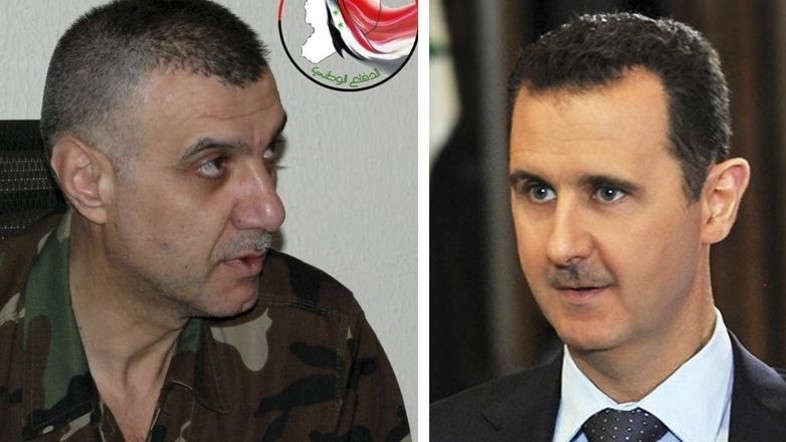By Mohanad Hage Ali
“The lout and lowlife, Suleiman al-Assad, the son of Hilal, the head of Military Housing in Latakia, was arrested on Monday from the Meridian of Latakia after receiving a beating from the good boys …. they said he cried and screamed. Among his entourage, was an official’s son called Amjad Aslan, also a friend of the Latakia Military Security Chief… they are all a group of louts and low lives who have wreaked havoc and infested corruption in the city …”
Such statements, critical of the practices of Syrian President Bashar al-Assad’s clan, appeared on regime loyalist Facebook pages to the surprise of many Syrians. With loyalist calls for their arrest, Suleiman and his father Hilal al-Assad were perceived as a liability in the coastal region.
SANA, Syria’s official news agency, announced the death of Hilal, the 47-year-old second cousin of Syria’s president on Monday, with some already accusing the regime of orchestrating his death to diffuse the Alawite sect’s growing resentment.
Certain reports claimed his death in the newly launched Alanfal campaign, a joint Islamist military operation against Syria’s coastal region. An Islamist group declared that Hilal, among other Allawite figures, died in a rocket attack on the city of Latakia.
Hilal is the grandchild of Ahmad al-Assad, the older half-brother of Hafez al-Assad, the late Syrian president. Following the revolution, he and his son were known for their thuggish practices, namely ransom kidnapping and rape, surpassing the reputation of his two notorious brothers, Haroun and Hail.
“Suleiman was dubbed ‘the President of the Syrian Coast’s republic; he acts in that capacity, a thug since his teenage years,’” according to an Alawite Latakia resident, who asked to remain anonymous for fear of reprisals. “They are notorious for rape and ransom kidnappings, and their headquarters at sports city is a Bermuda Triangle for their detainees.”
The rise of Shabiha
The Shabiha is a term originally used to describe the Assad clan’s smugglers and racketeers and their Allawite henchmen in the late 1970s. They exploited the high demand for foreign goods, especially cars and cigarettes, following newly imposed government restrictions on imports. Malek al-Assad, the son of Ibrahim, Hafez’s half-brother, was a pioneer in smuggling; he became a liability for his involvement in weapons’ smuggling, according to this detailed account of the rise of Shabiha by Syria Comment. Hafez imprisoned his nephew for days. Years after losing his lucrative business, he ended up a taxi driver on the Latakia–Damascus route, dying in car accident.
Fawwaz al-Assad, being Hafez’s full nephew, enjoyed better immunity than Malek. He led a successful career in smuggling cars and cigarettes, gaining increasing notoriety for rape, driving in a multi-car convoy, and ransom kidnappings.
Hafez reportedly intervened occasionally to curtail his excesses. As the other nephews and cousins grew older, they competed for power and wealth, often parading their brand new cars, with tinted windows and bodyguards brandishing their Kalashnikovs. The Shabiha were notorious for their gangster looks, tattoos, funky haircuts, massive biceps and beards.
Orwa Nyrabia, a Syrian filmmaker and former Latakia resident, believes that Hafez, a cunning leader often praised for his Machiavellian tactics, intentionally left his extended family uneducated, paving the way for their thuggish behavior.
“There was an interest in repressing the coastal region through the clan. Hafez’s eldest son, Bassel Assad, periodically curtailed and unleashed their activities in a semi-organized manner,” said Nyrabia.
The Assads, originally peasants from the Latakia Mountains, mostly took the easy illicit road to fortune and power, the Tashbeeh. They moved to the city of Latakia, a mostly Sunni coastal city with a few hundred thousand residents. Sectarian tensions hid some class hatred, according to residents from both communities, as Allawites often cited their history as discriminated against peasants and servants of urban Sunnis.
The Shabiha instilled fear among the population, while amassing fortunes from smuggling; the regime kept them at bay to fulfill the regime’s two pillars of control: demoralization and fear. After the revolution, and as the regime’s dependency on local militias grew, their power was unleashed. They repressed demonstrators in the coastal region, tortured and humiliated them, like in this infamous video from Bayada, a town in the Banyas province.
After Hilal’s death
Syrian activists recently reported that Suleiman, Hilal’s son, harassed a girl at a DVD store in Latakia; when the owner confronted him, he was forced to lick his shoes, then get naked, and dash around the many squared meters of his shop.
Following news of his father’s death, Suleiman and his Shabiha indiscriminately shot at Sunni neighborhoods. “Young Sunni men were left with little choices in Latakia,” according to a half Alawite, half Sunni city resident.
“Either they stay in the city and risk arrest, conscription and harassment, or join the rebels in the mountains”, he said. “Most chose the latter.”
......


